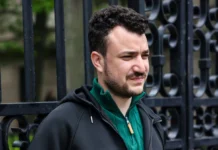If you’ve recently turned on your TV or even paid brief attention to Leonardo Di Caprio’s Oscar acceptance speech, you would be under the impression that sustainable living is a responsible no-brainer we should practice in daily life. Turns out, it’s not so easy being green.
“The biggest myth about sustainable living is probably that it is readily accessible for everyone,” says Shantell Bingham, a UVa graduate student pursuing her master’s in public health.
Bingham and fourth year architecture and global sustainability double major Artem Demchenko are the co-founders of Growing for CHANGE, a student-led initiative working to dissolve the barriers between UVa and the neighbouring Westhaven community via collaborative efforts in sustainable living projects. Bingham and Demchenko, who are also Dalai Llama Fellows, were inspired to start the program after uncovering the horrible history of redevelopment and relocation of home owners to public housing sites and coming to face with the perseverance of members of the community.

One such member is Joy Johnson, the chair of Charlottesville’s Public Housing Association of Residents (PHAR).
“She’s not only growing for herself but she spreads the love to her fellow residents,” says Bingham. “A lot of the inspiration for Growing for CHANGE came from encountering Ms. Joy’s banana trees in Westhaven and the thought that perhaps we can better serve our community by undertaking a collaborative approach to gardening among public housing residents.”
The desire to create a collaborative approach stems from deeper issues present in the current policies governing public housing and sustainability. Put simply, Charlottesville has an exclusivity problem.
After developing a research project that looked into recycling in public housing communities for a Global Sustainability class, Demchenko realised that those neighbourhoods did not have access to recycling due to a policy in place that limited the number of units allowed to be served per building.
“Living sustainable lives is a community-wide commitment, and UVa does it well, but when we decide to draw the lines around who is included in our communities then we create an imbalance that’s really not sustainable for anyone but hurts everyone. In a way it’s saying that living sustainable healthier lives is meant for a certain group of people,” says Bingham.
Demchenko agrees, saying one of the main goals of Growing for CHANGE is to promote community involvement that begins at the individual level, so as to include everyone in the quest for sustainable living.
“We hope that utilizing the co-design process not only to host engagement but also to promote ownership over the final garden design will go a long way in promoting self-maintenance,” says Demchenko. “When people are allowed to see things grow, there is a sense of pride that comes along with their success.”
Following months of outreach and designing and building planters, Bingham and Demchenko worked to involve UVa students and Westhaven community members alike in their project. By early April, the gardens were ready to be delivered.
“Shantell made three huge pots of chili, we turned on a Beyoncé playlist, and during the work of delivering gardens, soils, and tools, we would enjoy each other’s company. Our community partners from City of Promise and City Schoolyard Gardens, who donated seedlings to families, attended the event,” remembers Demchenko. “In all we had a blast!”
Under the guidance of Bingham and Demchenko and with the assistance of the UVa and Westhaven communities, Growing for CHANGE has evolved into a full-fledged movement, complete with an executive board and plans for sustainability.
Among those plans is to have Growing for CHANGE eventually become a non-profit, employing members of the community and working in collaboration with UVa students. The organisation has even pioneered a student-taught service learning class called Development through Revolution: Exploring Food Justice in Charlottesville. “One of the main goals of Growing for CHANGE was to dissolve social barriers between the University of Virginia and communities like Westhaven,” says Demchenko.
“The territory we’re heading into the future requires that all communities live sustainably, not just the privileged few. So it’s up to us as the privileged party to find the policies and limitations that pose barriers, and work alongside local community partners to make it happen,” adds Bingham.
















